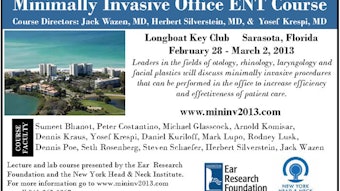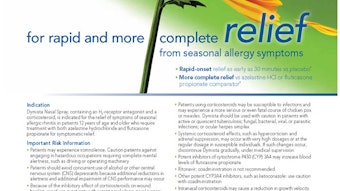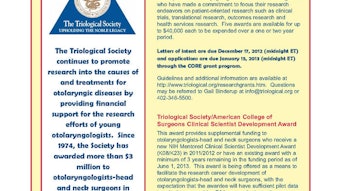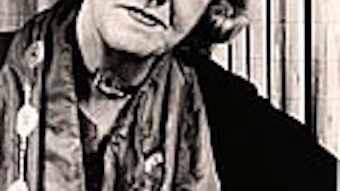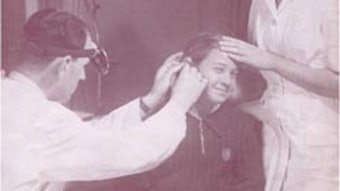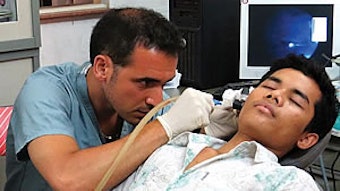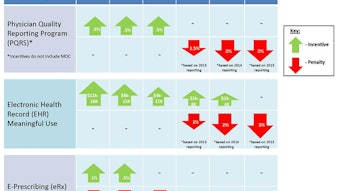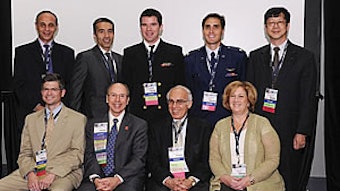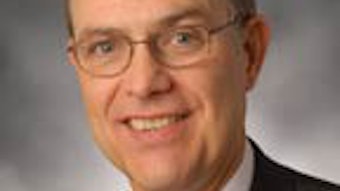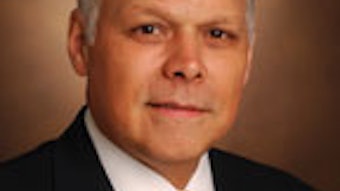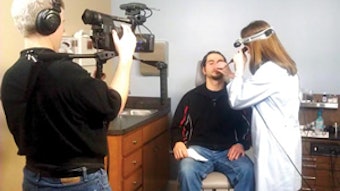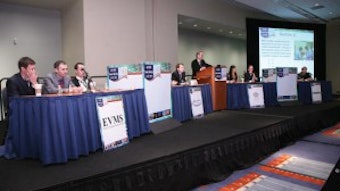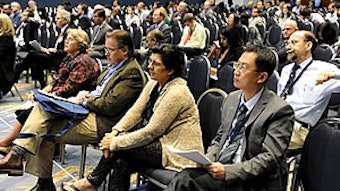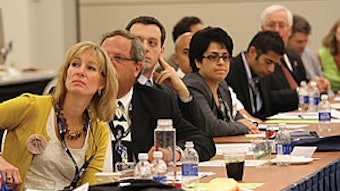2012 State Legislative Wrap-Up
In 2012, the AAO–HNS reviewed thousands of bills introduced across the country to determine relevancy to the specialty. Of those bills, the Academy actively tracked nearly 800 state bills, including many held over from the 2011 sessions. More than 50 key bills were identified in 31 states, resulting in the Academy providing strategy, advocacy resources, and coalition engagement to state otolaryngology societies, as needed. Members can view a full listing of these bills through the State Advocacy website, www.entnet.org/Practice/members/stateAdvocacy.cfm, which provides real-time access to active state legislation and relevant information. The following is a brief summary of some of the Academy’s 2012 priority state bills and other highlights from the year. Scope of Practice The AAO–HNS believes it is appropriate for non-physician providers to seek updates to statutes and regulations relating to their defined scope of practice to reflect advances in education and training. However, the AAO-HNS strongly opposes state legislation that would inappropriately expand the scope of practice of non-physician providers beyond their education and training. Enabling non-physician providers to independently diagnose, treat, or manage medical disorders could adversely affect the quality of patient care. This year, the AAO–HNS advocated to modify and/or defeat several potentially harmful bills that would have inappropriately expanded the scope of practice of non-physician professionals. In West Virginia, the AAO–HNS successfully opposed a bill that would have inappropriately expanded the scope of practice for speech-language pathology and audiology to include medical diagnosis, management, and treatment. Both Colorado and South Dakota passed legislation that essentially expands the scope of practice of speech-language pathologists. The AAO-HNS submitted letters of opposition to both state legislatures and will continue to monitor as the legislation is implemented. A carry-over bill in New York sought to permit non-physician oral and maxillofacial surgeons to perform elective surgeries in the oral and maxillofacial regions if granted hospital privileges. The AAO–HNS worked as part of a coalition to defeat this legislation. The California legislature passed a bill to allow audiologists to become qualified medical examiners to make determinations on workers’ compensation claims, an effort strongly opposed by the AAO–HNS. The governor ultimately vetoed the legislation. Taxes on Medical Procedures Each year, there is a re-emergence of proposals to tax medical procedures, and in light of extensive state budget shortfalls, this year has been no exception. The Stop Medical Taxes Coalition, of which the AAO–HNS is a member, asserts that the taxation of medical procedures is unfair for patients and is a “slippery slope” toward the taxation of other medical services. In California, there were two legislative proposals opposed by the AAO–HNS and the Coalition that would result in a tax on elective cosmetic procedures. Both proposals never progressed beyond committee. The New Jersey legislature passed a proposal supported by the AAO–HNS and the Coalition that was signed into law by the governor in early 2012. The law provides for a gradual repeal of the 6 percent tax currently imposed on cosmetic procedures. The tax will be reduced by 2 percent each year, for three years, ending with a 0 percent tax rate. Hearing Aid Services The coverage, sale, and dispensing of hearing aids is an issue considered by several states in various forms each year, and 2012 was no different. Arizona considered legislation that would have changed the requirements for hearing aid dispensing licensure. The bill, which was successfully opposed by the Academy and the state society, would have removed the current practicum exam and replaced it with a requirement of 160 hours of supervised work that would have included the identification of medical conditions. In New York, the Academy continued its work with the Patient Access to Hearing Aids (PAHA) Coalition on legislation to expand patients’ access to hearing aid services by amending an archaic law prohibiting physician practices from deriving a profit on hearing aid sales. In 2012, the PAHA Coalition attained introduction of both a Senate and Assembly amended bill. Massachusetts considered legislation for the first time to allow otolaryngologists to dispense hearing aids in the state, which is currently prohibited. The legislation did not progress in the 2012 session, but the Academy will continue to work with the state society for the passage of this legislation in 2013. Several states considered bills to require insurers to cover the cost of or expand benefits for hearing aids and/or cochlear implants, including Connecticut, Georgia, Hawaii, Illinois, Kansas, Maine, Massachusetts, Nebraska, New York, Rhode Island, Tennessee, Utah, Vermont, and Wyoming. A number of states also considered bills that would provide a tax credit and/or exemption for hearing aids, including Hawaii, Kansas, Michigan, Missouri, New Jersey, and Oklahoma. Truth-in-Advertising With the emergence of clinical doctorate programs for non-physician providers—which has led to many degree holders referring to themselves as “doctors”—there is growing confusion within the patient population about the level of training and education of their healthcare providers. In 2012, there were 11 truth-in-advertising bills introduced in the states. Legislation passed in Maryland, Mississippi, and Utah. In Maryland, the legislature passed a bill to require identification tags and advertisements to show the type of certification the practitioner holds subject to approval by the state medical board. The Academy worked with other national specialty organizations and the state medical society to develop and advocate for language that closes loopholes, but applies to all AAO-HNS members’ board certifications. The Washington legislature considered a bill that would have required advertisements by those who identify themselves as “doctors” to list their license, registration, and/or certifications. Tobacco Use and Smoking Cessation The Academy supports legislation and regulations that help reduce the use of tobacco products and exposure to secondhand smoke in order to promote healthy environments and lifestyles for the public. This year, bills were introduced in 15 states that sought to strengthen existing smoking ban laws, including California, Iowa, Kansas, Maine, Maryland, Mississippi, Missouri, New Jersey, Oklahoma, Rhode Island, South Carolina, Virginia, and West Virginia. A number of states considered proposals to mandate insurance coverage and/or benefits for tobacco cessation, including Hawaii, Illinois, Indiana, Massachusetts, New Jersey, New York, and Washington. Alabama, Hawaii, and Illinois proposed legislation to exempt certain establishments from a smoking ban if they paid to become licensed as exempt. Medical Liability Reform In 2012, there were 10 state legislatures that considered various tort reform measures, including those related to affidavits of merit, alternative reforms, caps on non-economic damages, defensive medicine issues, expert witnesses, health courts, or pre-trial screening panels. New Hampshire and New Jersey considered enacting or modifying caps on non-economic damage awards in medical liability cases, while Rhode Island considered proposed legislation on apology inadmissibility. A comprehensive medical liability reform bill was considered in Washington. In Connecticut, the Academy, with the state specialty society and state medical society, successfully opposed legislation that would have weakened the current standards for certificates of merit. In addition, across the nation, there were a number of legal challenges relating to medical liability actions, specifically a number of states that reviewed the constitutionality of caps on damages. In 2013, the Academy will continue to track and advocate on these important issues and others as they may arise. Many of these issues will continue into 2013 and beyond, as states look to adjust to the ever-changing healthcare environment. The Academy will continue to actively engage with specialty societies and state medical societies on these important issues to strengthen our voice in the state legislatures. For more information on state legislative issues or specific measures, contact AAO–HNS State Legislative Affairs at legstate@entnet.org or 1-703-535-3794.
In 2012, the AAO–HNS reviewed thousands of bills introduced across the country to determine relevancy to the specialty. Of those bills, the Academy actively tracked nearly 800 state bills, including many held over from the 2011 sessions. More than 50 key bills were identified in 31 states, resulting in the Academy providing strategy, advocacy resources, and coalition engagement to state otolaryngology societies, as needed. Members can view a full listing of these bills through the State Advocacy website, www.entnet.org/Practice/members/stateAdvocacy.cfm, which provides real-time access to active state legislation and relevant information. The following is a brief summary of some of the Academy’s 2012 priority state bills and other highlights from the year.
Scope of Practice
The AAO–HNS believes it is appropriate for non-physician providers to seek updates to statutes and regulations relating to their defined scope of practice to reflect advances in education and training. However, the AAO-HNS strongly opposes state legislation that would inappropriately expand the scope of practice of non-physician providers beyond their education and training. Enabling non-physician providers to independently diagnose, treat, or manage medical disorders could adversely affect the quality of patient care. This year, the AAO–HNS advocated to modify and/or defeat several potentially harmful bills that would have inappropriately expanded the scope of practice of non-physician professionals.
In West Virginia, the AAO–HNS successfully opposed a bill that would have inappropriately expanded the scope of practice for speech-language pathology and audiology to include medical diagnosis, management, and treatment.
Both Colorado and South Dakota passed legislation that essentially expands the scope of practice of speech-language pathologists. The AAO-HNS submitted letters of opposition to both state legislatures and will continue to monitor as the legislation is implemented.
A carry-over bill in New York sought to permit non-physician oral and maxillofacial surgeons to perform elective surgeries in the oral and maxillofacial regions if granted hospital privileges. The AAO–HNS worked as part of a coalition to defeat this legislation.
The California legislature passed a bill to allow audiologists to become qualified medical examiners to make determinations on workers’ compensation claims, an effort strongly opposed by the AAO–HNS. The governor ultimately vetoed the legislation.
Taxes on Medical Procedures
Each year, there is a re-emergence of proposals to tax medical procedures, and in light of extensive state budget shortfalls, this year has been no exception. The Stop Medical Taxes Coalition, of which the AAO–HNS is a member, asserts that the taxation of medical procedures is unfair for patients and is a “slippery slope” toward the taxation of other medical services.
In California, there were two legislative proposals opposed by the AAO–HNS and the Coalition that would result in a tax on elective cosmetic procedures. Both proposals never progressed beyond committee.
The New Jersey legislature passed a proposal supported by the AAO–HNS and the Coalition that was signed into law by the governor in early 2012. The law provides for a gradual repeal of the 6 percent tax currently imposed on cosmetic procedures. The tax will be reduced by 2 percent each year, for three years, ending with a 0 percent tax rate.
Hearing Aid Services
The coverage, sale, and dispensing of hearing aids is an issue considered by several states in various forms each year, and 2012 was no different.
Arizona considered legislation that would have changed the requirements for hearing aid dispensing licensure. The bill, which was successfully opposed by the Academy and the state society, would have removed the current practicum exam and replaced it with a requirement of 160 hours of supervised work that would have included the identification of medical conditions.
In New York, the Academy continued its work with the Patient Access to Hearing Aids (PAHA) Coalition on legislation to expand patients’ access to hearing aid services by amending an archaic law prohibiting physician practices from deriving a profit on hearing aid sales. In 2012, the PAHA Coalition attained introduction of both a Senate and Assembly amended bill.
Massachusetts considered legislation for the first time to allow otolaryngologists to dispense hearing aids in the state, which is currently prohibited. The legislation did not progress in the 2012 session, but the Academy will continue to work with the state society for the passage of this legislation in 2013.
Several states considered bills to require insurers to cover the cost of or expand benefits for hearing aids and/or cochlear implants, including Connecticut, Georgia, Hawaii, Illinois, Kansas, Maine, Massachusetts, Nebraska, New York, Rhode Island, Tennessee, Utah, Vermont, and Wyoming. A number of states also considered bills that would provide a tax credit and/or exemption for hearing aids, including Hawaii, Kansas, Michigan, Missouri, New Jersey, and Oklahoma.
Truth-in-Advertising
With the emergence of clinical doctorate programs for non-physician providers—which has led to many degree holders referring to themselves as “doctors”—there is growing confusion within the patient population about the level of training and education of their healthcare providers. In 2012, there were 11 truth-in-advertising bills introduced in the states. Legislation passed in Maryland, Mississippi, and Utah.
In Maryland, the legislature passed a bill to require identification tags and advertisements to show the type of certification the practitioner holds subject to approval by the state medical board. The Academy worked with other national specialty organizations and the state medical society to develop and advocate for language that closes loopholes, but applies to all AAO-HNS members’ board certifications.
The Washington legislature considered a bill that would have required advertisements by those who identify themselves as “doctors” to list their license, registration, and/or certifications.
Tobacco Use and Smoking Cessation
The Academy supports legislation and regulations that help reduce the use of tobacco products and exposure to secondhand smoke in order to promote healthy environments and lifestyles for the public. This year, bills were introduced in 15 states that sought to strengthen existing smoking ban laws, including California, Iowa, Kansas, Maine, Maryland, Mississippi, Missouri, New Jersey, Oklahoma, Rhode Island, South Carolina, Virginia, and West Virginia. A number of states considered proposals to mandate insurance coverage and/or benefits for tobacco cessation, including Hawaii, Illinois, Indiana, Massachusetts, New Jersey, New York, and Washington. Alabama, Hawaii, and Illinois proposed legislation to exempt certain establishments from a smoking ban if they paid to become licensed as exempt.
Medical Liability Reform
In 2012, there were 10 state legislatures that considered various tort reform measures, including those related to affidavits of merit, alternative reforms, caps on non-economic damages, defensive medicine issues, expert witnesses, health courts, or pre-trial screening panels. New Hampshire and New Jersey considered enacting or modifying caps on non-economic damage awards in medical liability cases, while Rhode Island considered proposed legislation on apology inadmissibility. A comprehensive medical liability reform bill was considered in Washington. In Connecticut, the Academy, with the state specialty society and state medical society, successfully opposed legislation that would have weakened the current standards for certificates of merit. In addition, across the nation, there were a number of legal challenges relating to medical liability actions, specifically a number of states that reviewed the constitutionality of caps on damages.
In 2013, the Academy will continue to track and advocate on these important issues and others as they may arise. Many of these issues will continue into 2013 and beyond, as states look to adjust to the ever-changing healthcare environment. The Academy will continue to actively engage with specialty societies and state medical societies on these important issues to strengthen our voice in the state legislatures.
For more information on state legislative issues or specific measures, contact AAO–HNS State Legislative Affairs at legstate@entnet.org or 1-703-535-3794.
